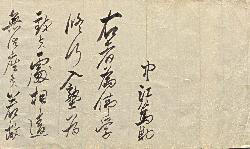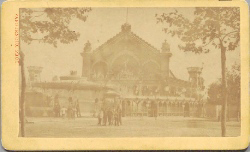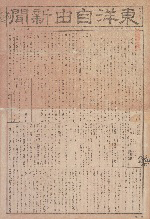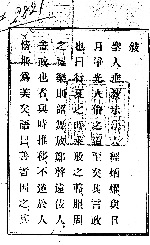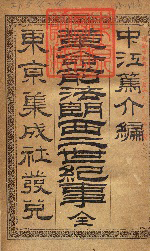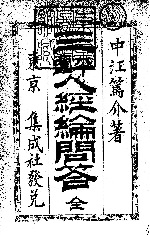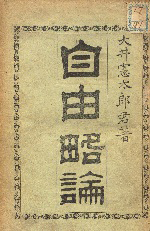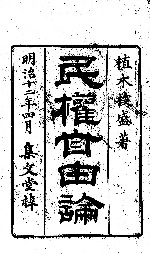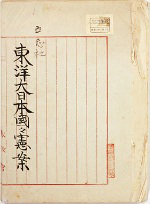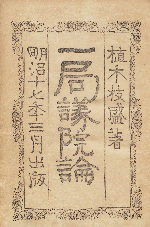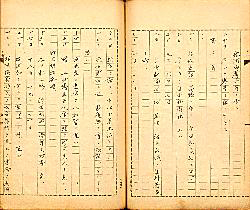![]()
Chapter 1: Politics and law
Section 2: NAKAE Chomin's ideology and various aspects of the Freedom and People's Rights Movement
The interest in French political thought was not simply academic, but also had a significant impact on political movements, specifically the Freedom and People's Rights Movement. The Freedom and People's Rights Movement began with the submission of the Petition for the Establishment of a Popularly Elected Assembly to the Sain (Advisory Board on Legislation) in 1874 by ETO Shimpei (1834-1874), ITAGAKI Taisuke (1837-1919), GOTO Shojiro (1838-1897), SOEJIMA Taneomi (1828-1905) and others. They were critical of the government's yushi sensei (lit. bureaucratic tyranny), and demanded the establishment of a national assembly elected by the people in addition to confronting the government on a number of issues including local autonomy, cutting land tax, revision of the unequal treaties, freedom of expression. At the beginning, the former Samurai were central to the movement, however later it spread to the common people. This section looks into French political thought among the individuals involved in the Freedom and People's Rights Movement, specifically NAKAE Chomin (1847-1901), who was known as the "Eastern Rousseau", OI Kentaro (1843-1922), UEKI Emori (1857-1892).
NAKAE Chomin
Kaiseijo kankei shorui [Papers of MITSUKURI Gempo and MITSUKURI Rinsho (Deposit), #180] 
NAKAE Chomin (Tokusuke) was born as the child of a foot soldier of the Tosa Domain in 1847. After studying Dutch studies under HOSOKAWA Junjiro (1834-1923), in September of 1865 he was sent to Nagasaki as a student of the Tosa Domain for French studies. In 1867, with the support of GOTO Shojiro, he went to Edo, and continued his studies after enrolling in MURAKAMI Eishun's (1811-1890) Tatsurido. Thereafter he served as an interpreter for the French minister plenipotentiary to Japan, Léon Roches (1809-1901), and studied under MITSUKURI Rinsho (1846-1897) in Tokyo after the Meiji Restoration.
These materials are documents vouching for Chomin which were submitted to MITSUKURI Rinsho by MORI Kyosuke (1834-?) an officer of the Kochi Domain in December 1870. By May of 1870, Chomin’s studies of French had improved enough to instruct students as a Bachelor (university graduate) at Daigaku nanko (the forerunner of the University of Tokyo).
NAKAE Chōmin shokan [Papers of NAKAE Chomin, #19-26]
Chomin obtained the support of OKUBO Toshimichi (1830-1878) and others; he departed Yokohama by ship with the Iwakura Mission in 1871, leaving to study in France. His stay in France was a little over 2 years, from January 1872 to April 1874. He studied law, history, philosophy and other subjects in Lyon and Paris, came to love the works of Voltaire, Montesquieu, Rousseau and others, building the foundation for the Freedom and People's Rights Ideology. He also developed relationships with SAIONJI Kimmochi (1849-1940), MATSUDA Masahisa (1845-1914) and other students overseas.
These materials are picture postcards sent to his mother and younger brother in his hometown while he was studying abroad in France. The majority is simply conveying his well-being, however there was also a conscious attempt to convey the scenery of France, as on the postcard dated December 10, 1872, which stated, "please collect these pictures, they are photos of famous places in France".
Tōyō jiyū shinbun, Tōyō jiyū shinbunsha, 1881 [WB43-169] 
After returning from France, Chomin opened a Futsugaku juku (lit. French studies school), and after working as a secretary for the Genroin (lit. Chamber of Elders) he again began studying classical Chinese. On March 18, 1881, together with Saionji and others, he founded and served as chief editor on the Tōyō Jiyū Shinbun, a radically liberal newspaper. In this paper, Chomin came out as a Freedom and People's Rights Movement polemicist. SAIONJI was born as high ranking imperial court nobility and after serving in the Boshin Civil War, he travelled to France in 1870, and studied law at the University of Paris. He was confronted with the Paris Commune (1871) after arriving in Paris. In 1881, he assumed the position of instructor at Meiji Law School (present day Meiji University) and participated in the founding of the newspaper as its president in March of the same year. However, the participation of SAIONJI, who was a member of the peerage, resulted in the consternation of the imperial court and SAIONJI soon left the paper after a confidential royal command from Emperor Meiji. The paper was published up until the 34th issue (dated April 30 of the same year), however the NDL only holds an original copy of the inaugural issue.
Jean-Jacques Rousseau, NAKAE Chōmin (Tr.), Min’yaku yakkai, Futsugakujuku shuppankyoku, 1882 [25-260] 
After the suspension of the publication of the Tōyō jiyū shinbun, Chomin founded the magazine Seiri sōdan [特47-619], and serialized a translation of Rousseau's The Social Contract in the magazine. This text was published based on the above in 1882. Chomin also made a unpublished translation written in with Kanji and Katakana in 1874 titled Min'yakuron but this text was a Chinese translation. The translation was carried out in parts, up to chapter 6 of the 2nd part, with a large amount of annotation by Chomin, allowing it to be thought of as an independent work. Thereafter, Chomin founded the Shinonome Shinbun newspaper in Osaka, and in 1890 he ran as a candidate from Osaka for member of the House of Representatives in the first election; however he became angered by the Liberal Party Tosa faction compromising with the budget, and soon quit on a pretext of being an alcoholic. Thereafter, he started several failed projects in Sapporo and other areas, and died of cancer in 1901. His posthumous works Ichinen yūhan (lit. A Year and a Half) [91-177] and Zoku ichinen yūhan (lit. A Year and a Half 2) [91-177] are also famous. He was 55 years old at the time of his death.
NAKAE Chōmin (Ed.), Kakumei zen Furansu Nisei kiji, Shūseisha, 1886 [33-123] 
This work generally covers the history of France from the reign of Louis XV (1710-1774) to the convocation of the Estates General and includes short biographies of Montesquieu, Voltaire, Rousseau and others. The "two periods" refers to the ages of Louis XV and Louis XVI (1754-1793), and the work does not speak of the French Revolution itself, but rather the lead up to the revolution. It may be that this was intended to compare Japanese society at the time to France under the Old Regime. As with Chomin's compilation, this does not use primary historical sources, but rather uses the works of the Second Empire Minister of Education Victor Duruy (1811-1894) and others. However, while Dury was indifferent to Rousseau, Chomin expressed sympathy with Rousseau, such as by introducing The Social Contract with the description, "The work advocates democracy as the most rational system, stating debate and dispute as the starting point of personal freedom". One can imagine this work as the results of a direct response to Rousseau's text.
NAKAE Chōmin, Sansuijin keirin mondō, Shūseisha, 1887 [26-139] 
This text is Chomin's principal work, and is a political discourse presented as a discussion between three imaginary individuals, a Gentleman of Western Learning, Master Nankai and a Champion of the East, as they drink sake. In comparison to the democratic Gentleman of Western Learning, who argues an idealism which places its faith in the progress of mankind, the expansionist Champion of the East preaches a doctrine of enriching the country and strengthening the military, while Master Nankai listens to both and gradually argues for the realization of constitutionalism, concluding the discussion. Regarding the dialogue style of the work, political scientist MARUYAMA Masao (1914-1996) compares it with catechism prior to Chomin, and points out that the dialogue in this work is not intended to be a means of forcing an absolute truth or dogma, but rather a means of understanding an issue from a variety of viewpoints. Chomin, who was considered an absolutist, actually possessed a mature political outlook, discussing detailed political decisions in a relativist manner similar to FUKUZAWA. A French translation has also been published in recent years (Dialogues politiques entre trois ivrognes [A22-B9]).
OI Kentaro and UEKI Emori
ŌI Kentarō, Jiyū ryakuron, Shōbidō, 1889 [17-181] 
OI Kentaro was a politician and Freedom and People's Rights Movement activist. He was born as the child of a farming family in Buzen (Oita Prefecture), and after studying Dutch studies and chemistry in Nagasaki, and French studies and chemistry in Edo, in 1868 he became a student of MITSUKURI Rinsho and met Chomin. After serving in the Ministry of the Army, he was involved in translating texts. In 1874, he supported a petition in a dispute revolving around the Petition for the Establishment of a Popularly Elected Assembly, and opposed the the arguments of prematurity by KATO Hiroyuki (1836-1916) and others. After acting as an attorney, he also participated in the Liberal Party. Later his jingoistic advocacy intensified, and he was elected as a member of the House of Representatives in 1894.
This text is a work from 1889, written when he was imprisoned for participation in the Osaka Incident related to political turmoil in Korea. It states that, in order to "protect against intrusions and affronts from other countries", and maintain the nation's "peace and welfare" "a new society of freedom and equality" must be aimed for, and also discusses the "natural liberty of human beings".
UEKI Emori, Minken jiyūron, Shūbundō, 1879 [特39-278] 
UEKI Emori was a Meiji Era politician and Freedom and People's Rights Movement activist. He was born in Tosa (Kochi Prefecture). After studying Chinese studies he independently studied politics and economics, and visited Tokyo where he was influenced by a lecture by FUKUZAWA Yukichi. He also became close with ITAGAKI and in 1881 drafted the Nihonkoku kokken'an (lit. Constitution draft of Japan), in addition to participating in the formation of the Liberal Party and served in a leadership role. He won the 1st election for members of the House of Representatives in 1890, however he died early thereafter at the age of 36. He is also known for the abolitionism of legalized prostitution.
UEKI differed from SAIONJI, Chomin and others, in that he had no experience as an exchange student in France, and had also never read an original work in French. However, it is assumed he became a staunch supporter of popular sovereignty by transcribing Chomin's translation of Rousseau. This text was UEKI's first work and is written in an extremely simple style in order to make people's rights ideology more available to the masses.
Tōyō dainipponkoku kokken an [Papers of MAKINO Nobuaki (Letters), #89] 
The League for Establishing a National Assembly, which was formed with the heightening of the Freedom and People's Rights Movement, planned to discuss a constitution draft at their meeting in October of 1881, and aimed at this, each political organization member of the League created their own constitution drafts (private draft constitutions). This material is one of these, a draft constitution drawn up by UEKI who was a member of the Risshisha (Self Help Society) constitution draft committee. The draft features a proposal of a Diet-centric governing structure with the Emperor positioned as the head of military affairs and diplomacy and a federation modelled on the United States and Switzerland, which respect local autonomy; and influenced by the United States Declaration of Independence and French Declaration of the Rights of Man and of the Citizen, the 4th chapter secures the people's rights to freedom in fine detail, and also recognizes the right of resistance and right of revolution necessary for securing this freedom. This is considered the most democratic in content of the various private draft constitutions. In actuality, the Imperial Mandate for Establishing the Diet was issued on October 12 of the same year, but no deliberations were held on the draft constitutions, and those who came to Tokyo for the meeting formed the Liberal Party.
UEKI Emori, Ikkyoku giinron, 1884 [30-150] 
It was not yet decided if a unicameral system or bicameral system would be used for the Diet to be established. Opinions were divided even within the Freedom and People's Rights Movement. In this text, UEKI support a unicameral system. At one time, Guizot supported the bicameral system for its superior stability, however referencing examples in the various countries of Europe and America, UEKI argues against Guizot. UEKI called the bicameral system a "relic of the feudal age", and believed that the unicameral system was best for ensuring the freedom and rights of the people. For UEKI, establishing a bicameral system was equivalent to dividing the national will. One can see the influence of popular sovereignty on UEKI here. It can be said that this support of the unicameral system was an advance criticism of the conservative role played by the House of Peers under the Constitution of the Empire of Japan. However, when the Freedom and People's Rights Movement later collapsed, UEKI shifted to supporting the bicameral system.
Ueki Emori nikki [Constitutional Government Documents Collection, #1297] 
These materials are a transcription of the journal kept by UEKI from the time he went to Tokyo as a selected student of the Kainan shijuku school in 1873, until he died in 1892. The original was destroyed by fire of war, however the content has been conveyed by these materials and other reproductions. A republication of these materials was published in 1955 as the Ueki Emori Nikki (lit. Ueki Emori's Diary) [289.1-U286u-K].
The content mainly consists of a journal of external deeds, however it provides a view of his studies as a youth, records of various literary works and speeches thereafter, and of his friends and acquaintances, and is a valuable material for learning about the Freedom and People's Rights Movement. In the section from October 13, 1882, can be found an entry which states, "Last night, I had a dream I went to France and had a discussion with Spencer". "Spencer" is assumed to refer to the British philosopher Herbert Spencer (1820-1903), however it is simply a discussion of a dream and doesn't provide further explanation. It is interesting that the setting for the dream is France.

